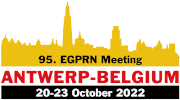Research on integrated community care: Focus on GP, patients and population
Dear colleagues and members of EGPRN,
On behalf of EGPRN and the local organizing committee we welcome you at the 95th meeting in Antwerp in October 2022.
People and populations are faced with diverse and complex problems nowadays. Society is changing with an ageing population, multiculturality, refugees, a pandemic and climate crisis. These changes have shown the fragility of our health care systems and the increased inequity within our society. This is a challenge for health and social care workers and society in general.
Traditionally family medicine and general practice is -focused on individual patients and their health problems and needs. Increasingly, GPs are providing interdisciplinary care towards improved health and wellbeing of their patients. However, trends and challenges in our society demand for an increase in interdisciplinary working – bridging the gap between health and social care and focusing more on the whole community and the determinants of their health and wellbeing and working across sectors and together with the stakeholders in the community. This means changes towards an integrated community care approach. It implies a shift from disease-oriented and problem-based care towards goal-based and patient-centred care. Key is co-development with individuals and communities, as well as connection between health and social care to improve clinical outcomes in terms of efficiency, effectiveness, and patient satisfaction. Integrated community care needs interdisciplinarity to have a common understanding of the problems and to find solutions. This approach builds upon the local community and its defined population. The local community is the living environment of the population for which we take care as GPs and other health care providers. Each local community has his own challenges in terms of population (demographics, health problems and vulnerability) but it also offers opportunities as a natural environment with sustainable resources and dynamics of health and social care providers.
What does this mean for research in primary care and general practice? First, the context of primary care research will shift increasingly from the individual clinical practice to community- and population-based research. Therefore, other, and innovative research designs are necessary, such as mixed-methods research, case study research and realist evaluation research, to evaluate integrated community care programs and participatory action research to support cocreation between fieldworkers, patients, and researchers. Outcomes of research can be both on the individual patient as on population and community level. Theme papers will focus on these innovative research methods to answer research questions on integrated community care. Freestanding papers will be welcome as well. Pre-conference workshops will offer an opportunity for researchers to discuss research designs with experienced researchers in the field.
Organising committee
Host Organising Committee
- Ass. Prof. Dr. Hilde Bastiaens
- Ass. Prof. Dr. Lieve Peremans
- Prof. Dr. Roy Remmen
- Ass. Prof. Dr. Josefien Van Olmen
- Prof. Dr. Paul Van Royen

